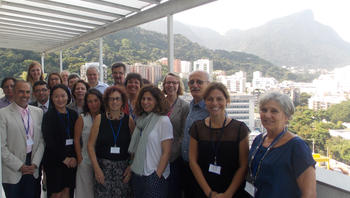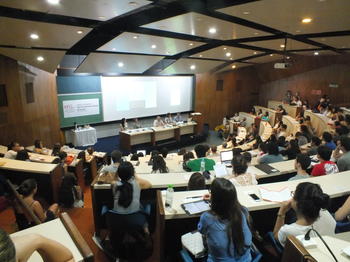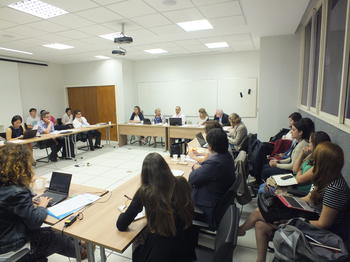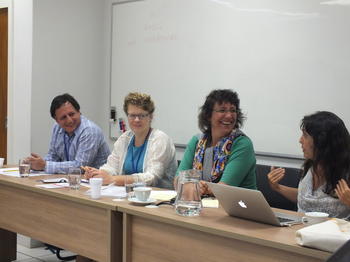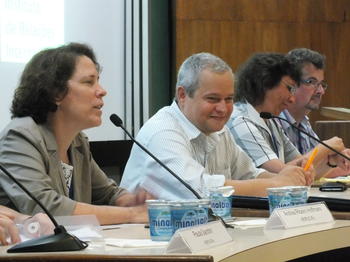Comparative Regionalism: Discussing the Oxford Handbook of Comparative Regionalism in Rio de Janeiro
Jul 04, 2016
Conference Participants at Pontifical Catholic University Rio de Janeiro
Image Credit: KFG
Auditorium at the Pontifícia Universidade Católica do Rio de Janeiro
Image Credit: KFG
Roundtable at the Instituto de Relações Internacionales
Image Credit: KFG
Michel Leví Coral, Brigitte Weiffen, Tanja A. Börzel, Lorena Ruano Gómez
Image Credit: KFG
Andrea Ribeiro Hoffmann, Paulo Esteves, Tanja A. Börzel & Thomas Risse
Image Credit: KFG
The Oxford Handbook of Comparative Regionalism is on tour again. After an initial event at the National University of Singapore (NUS) last October, the Kolleg-Forschergruppe “The Transformative Power of Europe” took the Handbook to Pontifical Catholic University Rio de Janeiro (PUC) for a two-day conference co-hosted by Andrea Ribeiro Hoffmann at the Institute for International Relations (IRI). On April 7-8, 2016, selected authors discussed the findings of their chapters with leading scholars from Latin America during four panels and two roundtable discussions.
Two issues appeared time and again during the discussions and thus connected the panels and roundtables: the implications of global trends of regionalism for South and Latin America, and more generally the normative assessment of regionalism. Is regionalism in fact as good as commonly assumed by literature and practitioners? The first panel sketched ways to define and analyze comparative regionalism through theories of regional cooperation and integration (Tanja A. Börzel, FUB - Freie Universität Berlin) and approaches of diffusion (Thomas Risse, FUB), stressing among others the assumption of mainstream theories that regionalism is a worthwhile endeavor. The discussion continued with the emergence, design, and effects of trade governance (Soo Yeon Kim, NUS) and inter-regional cooperation (Andrea Ribeiro Hoffmann, PUC). In a similar fashion, the third panel explored regional development governance (Laszlo Bruszt, European University Institute Florence) and regional social and gender governance (Anna van der Vleuten, RU - Radboud University, Nijmegen). Both panels concluded that we know surprisingly little about the (negative and positive) effects of regional cooperation and integration in these policy fields.
Finally, Andrea Bianculli (Institut Barcelona d’Estudies Internactionals) presented regionalism and regionalization in Latin America, including the construction of the region – also in relation to South America – and its institutions, and Tanja A. Börzel and Thomas Risse concluded with a discussion of the Spaghetti Bowls and Alphabet Soups of regional organizations across the continents. The panels were attended by a large number of undergraduate and graduate students of PUC and thus characterized by a lively debate between the panelists and the audience.
The two roundtable discussions took place in a more informal setting and were attended by a number of graduate students. The first roundtable on “Conflict resolution in Latin America and Europe” had been co-organized with the Global South Unit for Mediation, with Claudia Fuentes and Monica Herz (PUC), Antonio Jorge Ramalho (Union of South American Nations, Defense School), Paolo Roberto de Almeida (Ministry of Foreign Affairs, Brazil), Rut Diamint (Universidad Torcuato Di Tella, Argentina), and Thomas Risse. Most prominently, the role of UNASUR in mediating regional conflicts was discussed in opposition to more conservative state-centric views on regional security.
The conference closed with a roundtable on “EU-Latin American relations,” with Paula Sandrin (PUC), Andrea Ribeiro Hoffmann (PUC), Lorena Ruano Gómez (CIDE - Center for Research and Teaching in Economics, Mexico), Michel Levi Coral (UASB - Universidad Andina Simón Bolívar, Ecuador), Tanja A. Börzel and Brigitte Weiffen (Sao Paolo University). Participants discussed the status quo and viability of political and academic relations between Europe and Latin America, especially comparing the utility of inter-regional relations with the benefits of increased cooperation with a single strategic partner.
We thank the discussants for their valuable feedback: Diana Tussie (FLACSO - Facultad Latinoamericana de Ciencias Sociales, Argentina), Mercedes Botto (FLACSO), Jose Briceno Ruiz (Universidad de los Andes, Merida), Anna van der Vleuten (RU), Matthew Bishop (University of the West Indies, St. Augustine), Lorena Ruano Gómez (CIDE), Michel Levi Coral (UASB), and Miriam Gomes Saraiva (Universidade do Estado do Rio de Janeiro).
Next up is a two-day event at University of Pretoria, South Africa, in November 2016, where authors and editors will discuss their findings with scholars from Sub-Saharan Africa.
